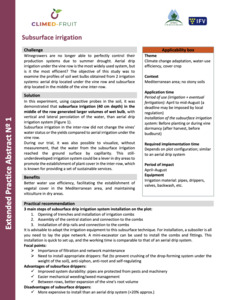{Tool} Subsurface irrigation. Creator(s): Serrano, Eric and Dufourcq, Thierry. Issuing Organisation(s): IFV Sud-ouest. (2023)
Preview |
PDF
- Published Version
- English
653kB |
![[thumbnail of Bildschirmfoto 2025-03-13 um 05.58.58.png]](/55050/2.hassmallThumbnailVersion/Bildschirmfoto%202025-03-13%20um%2005.58.58.png)  Preview |
Image (PNG)
- Cover Image
- English
342kB |
Preview |
PDF
- Published Version
- Greek/Ellinika
440kB |
Preview |
PDF
- Published Version
- Spanish/Español
612kB |
Preview |
PDF
- Published Version
- Croatian/Hrvatski jezik
644kB |
Preview |
PDF
- Published Version
- Italian/Italiano
639kB |
Preview |
PDF
- Published Version
- Portuguese/Portugues
654kB |
Preview |
PDF
- Published Version
- French/Francais
631kB |
Document available online at: https://climed-fruit.eu/wp-content/uploads/2025/01/1.-OFIVO-EPA_EN.pdf
Summary
This practice abstract deliers benefits and practical recommendations concerning subsurface irrigation including 3 main steps of subsurface drip irrigation system installation on the plot. You will also learn about simplified cost/benefit analysis for subsurface irrigation and get various links with further information materials.
| EPrint Type: | Practice tool |
|---|---|
| Teaser: | Better water use efficiency, facilitating the establishment of vegetal cover in viticulture. |
| What problem does the tool address?: | Winegrowers are no longer able to perfectly control their production systems due to summer drought. Aerial drip irrigation under the vine row is the most widely used system, but is it the most efficient? The objective of this study was to examine the profiles of soil wet bulbs obtained from 2 irrigation systems: aerial drip located under the vine row and subsurface drip located in the middle of the vine inter-row. |
| What solution does the tool offer?: | In this experiment, using capacitive probes in the soil, it was demonstrated that subsurface irrigation (40 cm depth) in the middle of the row generated larger volumes of wet bulb, with vertical and lateral percolation of the water, than aerial drip irrigation system (Figure 1). Subsurface irrigation in the inter-row did not change the vines' water status or the yields compared to aerial irrigation under the vine row. During our trial, it was also possible to visualize, without measurement, that the water from the subsurface irrigation reached the ground surface by capillarity. This still underdeveloped irrigation system could be a lever in dry areas to promote the establishment of plant cover in the inter-row, which is known for providing a set of sustainable services. |
| Country: | France |
| Type of Practice Tool: | Practice abstracts |
| Keywords: | climate change, climate change adaptation, viticulture, grapes, agricultural water management, irrigation, climate smart agriculture, sustainability, resilience |
| Agrovoc keywords: | Language Value URI English climate change http://aims.fao.org/aos/agrovoc/c_1666 English climate change adaptation http://aims.fao.org/aos/agrovoc/c_1374567058134 English viticulture http://aims.fao.org/aos/agrovoc/c_8277 English grapes http://aims.fao.org/aos/agrovoc/c_3359 English agricultural water management http://aims.fao.org/aos/agrovoc/c_e0257e3f English irrigation http://aims.fao.org/aos/agrovoc/c_3954 English climate smart agriculture -> climate-smart agriculture http://aims.fao.org/aos/agrovoc/c_1361789093890 English sustainability http://aims.fao.org/aos/agrovoc/c_33560 English resilience http://aims.fao.org/aos/agrovoc/c_1374480530924 |
| Subjects: | Environmental aspects Crop husbandry > Irrigation and drainage |
| Research affiliation: | European Union > Horizon Europe > OrganicClimateNET > selected tools European Union > Organic Farm Knowledge |
| Horizon Europe or H2020 Grant Agreement Number: | 101136880 |
| Related Links: | https://organic-farmknowledge.org/tool/55050, https://organicclimatenet.eu/, https://organic-farmknowledge.org/tool/54465, https://organic-farmknowledge.org/tool/54987, https://organic-farmknowledge.org/tool/39630 |
| Project ID: | OFK |
| Deposited By: | Rüger, Madelaine Lea |
| ID Code: | 55050 |
| Deposited On: | 14 Mar 2025 09:39 |
| Last Modified: | 30 Jul 2025 12:11 |
| Document Language: | English, Croatian/Hrvatski jezik, French/Francais, Greek/Ellinika, Italian/Italiano, Portuguese/Portugues, Spanish/Español |
| Status: | Published |
Repository Staff Only: item control page


